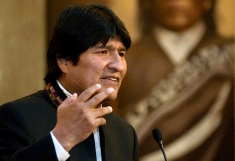
(above) Bolivian President Evo Morales has called on the United Nations and European Union to donate military equipment to his country's fight against drug trafficking.
Bolivia's Morales Seeks Anti-Drug Support from UN, EU
December 14, 2011 - insightcrime.org
Written by Geoffrey Ramsey
Asserting that the donation of "seven or 10" helicopters would be the equivalent of merely "pulling a hair" for either international organization, Morales publicly urged them to contribute more to counternarcotics programs in his country. He emphasized the need for helicopters and radars, which he said were much-needed by Bolivian narcotics police.
This shortage likely dates back to 2008, when Morales expelled then-U.S. Ambassador Phillip Goldberg and all US Drug Enforcement Administration (DEA) agents from the country, accusing them of meddling in Bolivian politics. In the absence of DEA equipment, Morales has been finding it difficult to rein in illicit coca cultivation. As InSight Crime has reported, this phenomenon is complicated by the country's legalization of coca grown for traditional purposes, such as for medicinal and ceremonial use.
The Morales government has been active in seeking support elsewhere, recently turning to neighboring Brazil to supply several unmanned aerial vehicles (UAVs), which it hopes to use in order to crack down on drug flights in and out of the country.
Bolivia has also been improving its relationship with the US in recent months, agreeing in November to renew diplomatic ties with the North American country. Although Morales has refused to allow the DEA back into Bolivia, the exchange of ambassadors will likely herald more support for counternarcotics programs in the country. Still, the issue of soveriengty is bound to be a priority for the Morales administration, as illustrated by its recent last-minute cancellation of a trilateral security pact with the US and Brazil on the basis that the documented needed rewording to allow for more Bolivian control over anti-drug operations.